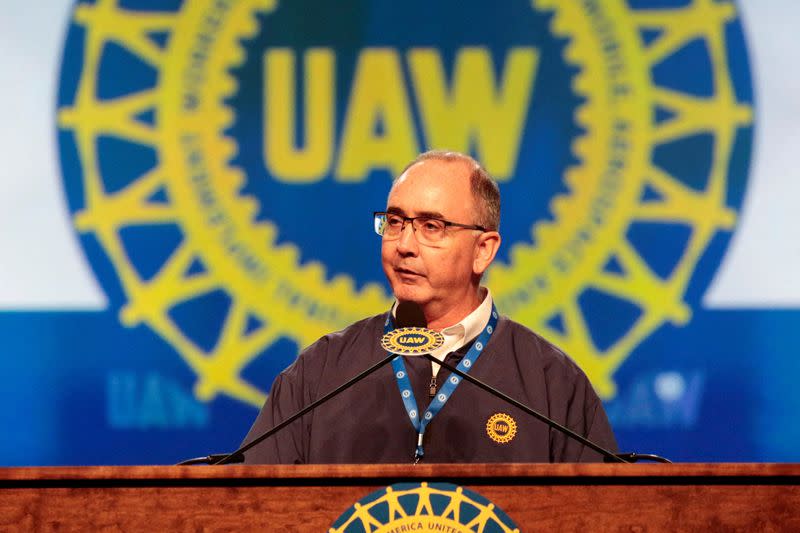Potential UAW strike could cut production, push up vehicle prices, analysts say

By Priyamvada C
(Reuters) - A prolonged coordinated strike by the United Auto Workers (UAW) union against the Detroit Three automakers could cut production by thousands, potentially pushing up vehicle prices and exacerbating supply-chain disruptions, analysts said.
The auto industry is on edge as the current four-year contracts between the UAW and General Motors, Ford Motor Co and Stellantis for hourly U.S. workers expire on midnight Sept. 14, after which the union's chief has warned of a possible coordinated strike.
New vehicle prices may rise by less than 2% if the strike lasts about two weeks, according to automotive consulting firm J.D. Power.
"Everyone's going to see higher prices regardless of the company you buy from if it (strike) continues for more than two weeks," said Tyson Jominy, vice president, data and analytics at J.D. Power.
He added that companies such as Toyota, Honda and Volkswagen may also benefit if the domestic brands quickly run out of inventory to sell.
Jominy said the used car market, which quickly follows the underlying trends of the new market, may see a greater impact on prices if there are fewer substitutes for buying a vehicle.
CFRA analyst Garrett Nelson said strikes at all three automakers would cut North American auto production by 150,000 units per week, resulting in higher vehicle prices as inventories deplete.
That would mean an end to the trend of cooling vehicle prices in recent months, at a time when inflation continues to pinch U.S. consumers.
"Even if the UAW continues to negotiate beyond its deadline, the lack of a deal and threat of a strike should discourage auto dealers from offering discounts on their existing inventory and drive an uptick in vehicle prices," J.P. Morgan insurance analyst Jimmy Bhullar said.
Deutsche Bank previously estimated that a strike would hit earnings at each affected automaker by about $400 million to $500 million per week of production.
GM and Ford are also in the midst of a multi-billion dollar EV transition and brokerage Wedbush estimates adoption of some major UAW proposals to result in an increase in the price of electric vehicles rolling out over the next 12 to 18 months.
"(Ford CEO Jim) Farley and (GM CEO Mary) Barra both face some tough decisions ahead and find themselves with the back against the wall," Wedbush analyst Dan Ives wrote in a note.
The resulting disruptions from any strikes are also likely to benefit EV leader Tesla, industry experts said. Some dealers are also expected to gain from shortages of vehicles.
"The big thing to keep in mind (is) that (the) UAW strike could help stabilize our margins, which is quite nice," U.S. auto retailer Lithia Motors' CEO Bryan DeBoer said during a July analyst call.
Another large dealer, AutoNation, previously said it had built up inventories from domestic manufacturers, which should provide some cushion.
However, UAW president Shawn Fain rejected the idea that worker wages were responsible for auto prices going up in the last few years.
In a video released on Thursday titled "Here's what the Big Three and the corporate media's NOT telling you about car prices," Fain said "corporate greed" was responsible for rising car prices.
"In the last four years, the average price of a new car is up 30%, meanwhile auto worker wages have risen a meager 6%," Fain said.
(Reporting by Priyamvada C, Nathan Gomes, Abhijith Ganapavaram in Bengaluru; Editing by Anil D'Silva)

 Yahoo Finance
Yahoo Finance 